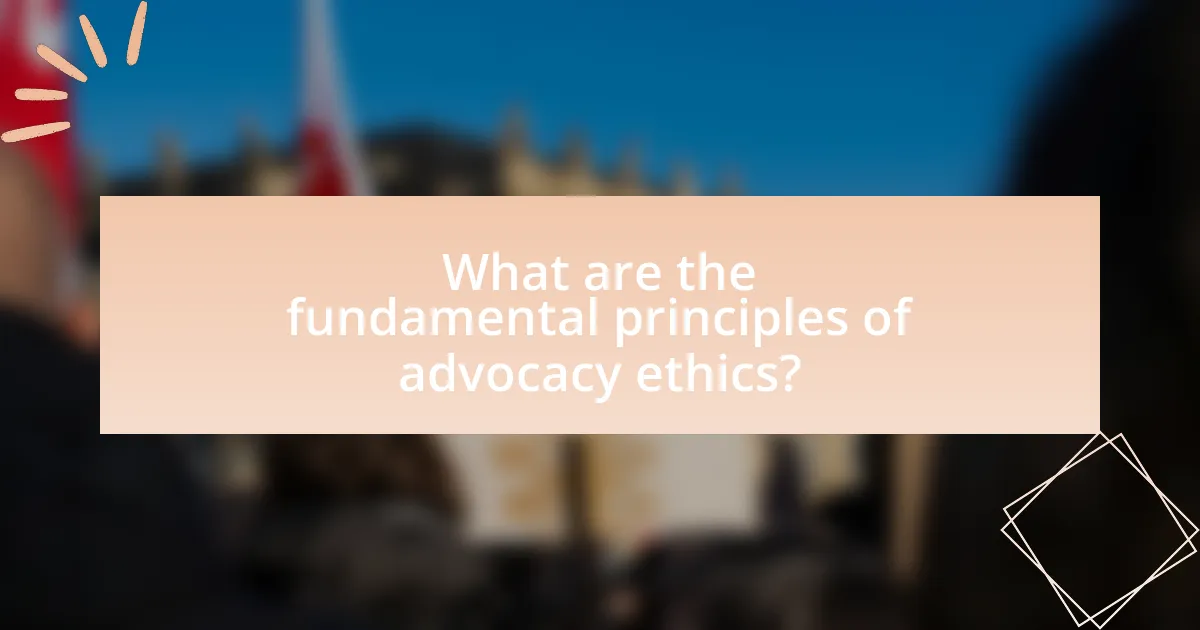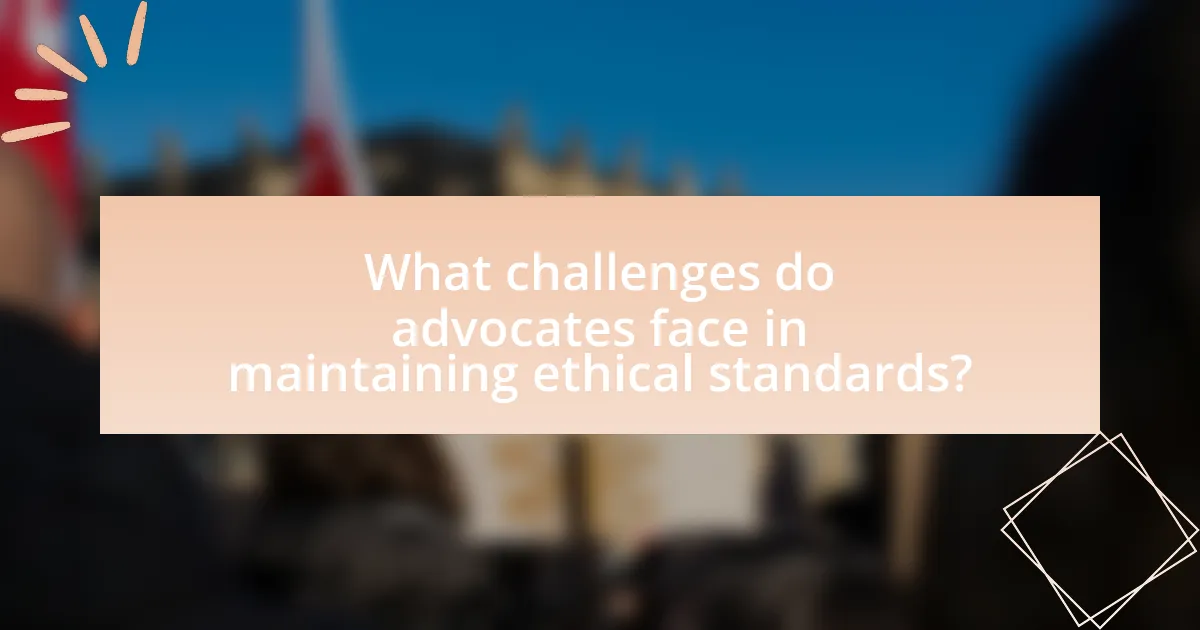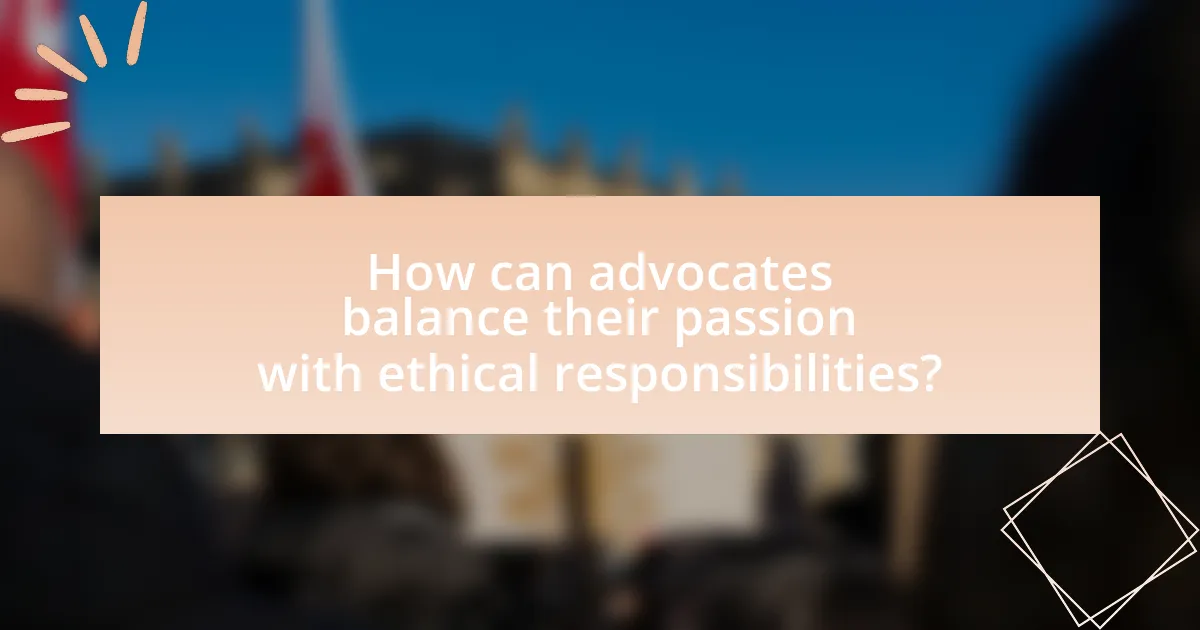The article focuses on the ethics of advocacy, emphasizing the need to balance passion with responsibility. It outlines fundamental principles of advocacy ethics, including honesty, integrity, respect for individuals, and accountability. The discussion highlights the intersection of personal conviction and ethical standards, the importance of transparency, and the challenges advocates face in maintaining ethical practices. Additionally, it explores the implications of ethical advocacy for future generations and offers practical tips for advocates to ensure responsible engagement while promoting social change.

What are the fundamental principles of advocacy ethics?
The fundamental principles of advocacy ethics include honesty, integrity, respect for individuals, and accountability. Honesty requires advocates to provide accurate information and avoid misleading statements, ensuring that their actions are transparent. Integrity involves maintaining moral principles and consistency in actions, fostering trust among stakeholders. Respect for individuals emphasizes the importance of valuing the dignity and rights of all parties involved, while accountability holds advocates responsible for their actions and decisions, ensuring they align with ethical standards. These principles are essential for maintaining credibility and fostering a positive impact in advocacy efforts.
How do passion and responsibility intersect in advocacy?
Passion and responsibility intersect in advocacy by driving individuals to act on their beliefs while ensuring that their actions are ethical and informed. Advocates fueled by passion often mobilize communities and raise awareness about critical issues, yet they must also recognize the ethical implications of their actions, ensuring that they do not misrepresent facts or exploit vulnerable populations. For instance, responsible advocacy requires thorough research and understanding of the issues at hand, as seen in campaigns that successfully balance emotional appeal with factual accuracy, such as the global climate movement, which combines passionate activism with scientific data to promote sustainable practices. This intersection emphasizes that effective advocacy is not solely about fervor but also about accountability and integrity in representing the causes they champion.
What role does personal conviction play in ethical advocacy?
Personal conviction serves as a foundational element in ethical advocacy by driving individuals to champion causes they believe in passionately. This intrinsic motivation often leads advocates to engage deeply with issues, fostering a commitment to ethical standards and integrity in their efforts. For instance, advocates who possess strong personal convictions are more likely to conduct thorough research, represent facts accurately, and respect diverse perspectives, thereby enhancing the credibility of their advocacy. Studies have shown that advocates with clear personal beliefs tend to be more effective in mobilizing support and influencing public opinion, as their authenticity resonates with audiences.
How can advocates ensure they remain responsible while pursuing their passions?
Advocates can ensure they remain responsible while pursuing their passions by adhering to ethical guidelines and maintaining transparency in their actions. Ethical guidelines, such as those established by organizations like the American Psychological Association, emphasize the importance of integrity, accountability, and respect for individuals’ rights. By following these principles, advocates can align their passion with responsible practices. Additionally, maintaining transparency about their motivations and the potential impacts of their advocacy helps build trust and accountability within the communities they serve. This approach not only fosters ethical advocacy but also enhances the effectiveness of their efforts in promoting social change.
Why is ethical advocacy important in society?
Ethical advocacy is important in society because it ensures that the interests of individuals and communities are represented fairly and justly. This form of advocacy promotes accountability, transparency, and respect for human rights, which are essential for a functioning democracy. For instance, ethical advocacy helps prevent the exploitation of vulnerable populations by ensuring that their voices are heard and considered in decision-making processes. Research indicates that ethical advocacy leads to more equitable policies and practices, as seen in studies by the American Psychological Association, which highlight the positive impact of ethical standards on social justice outcomes.
What impact does unethical advocacy have on communities?
Unethical advocacy negatively impacts communities by eroding trust and fostering division. When advocates prioritize personal gain or misleading information over community welfare, they can create misinformation that misguides public opinion and policy. For instance, studies have shown that communities exposed to unethical lobbying practices often experience increased polarization, which can lead to social unrest and decreased civic engagement. This erosion of trust can result in diminished participation in community initiatives and a reluctance to support legitimate advocacy efforts, ultimately harming the community’s ability to address its needs effectively.
How can ethical advocacy contribute to social change?
Ethical advocacy contributes to social change by promoting justice, equality, and accountability through responsible communication and action. This form of advocacy ensures that the voices of marginalized communities are heard and respected, fostering an inclusive dialogue that can lead to policy reforms and societal shifts. For instance, the Civil Rights Movement in the United States exemplifies how ethical advocacy mobilized public support and led to significant legislative changes, such as the Civil Rights Act of 1964, which aimed to eliminate discrimination. By adhering to ethical principles, advocates can build trust and credibility, which are essential for mobilizing collective action and achieving sustainable social change.

What challenges do advocates face in maintaining ethical standards?
Advocates face significant challenges in maintaining ethical standards, primarily due to conflicting interests and pressures from stakeholders. These pressures can lead to situations where advocates may feel compelled to compromise their ethical principles to achieve desired outcomes. For instance, advocates often navigate complex relationships with clients, funders, and the public, which can create dilemmas regarding transparency and accountability. Additionally, the emotional intensity of advocacy work can cloud judgment, making it difficult to adhere strictly to ethical guidelines. Research indicates that 70% of advocates report experiencing ethical dilemmas in their work, highlighting the prevalence of these challenges.
How do external pressures influence advocacy ethics?
External pressures significantly influence advocacy ethics by shaping the priorities and actions of advocates. These pressures can stem from various sources, including public opinion, funding sources, political climate, and social movements. For instance, advocates may alter their messaging or strategies to align with donor expectations or to respond to shifts in public sentiment, which can lead to ethical dilemmas regarding authenticity and integrity. Research indicates that when advocates prioritize external pressures over core ethical principles, they risk compromising their mission and the trust of their constituents, as seen in cases where organizations have faced backlash for perceived misalignment with their stated values.
What are common ethical dilemmas faced by advocates?
Common ethical dilemmas faced by advocates include conflicts of interest, the challenge of maintaining client confidentiality, and the pressure to prioritize personal beliefs over the needs of clients. Conflicts of interest arise when an advocate’s personal or professional relationships may compromise their ability to represent a client effectively. Maintaining client confidentiality is crucial, yet advocates may struggle with situations where disclosure could prevent harm. Additionally, advocates often face the dilemma of balancing their own values and beliefs with the best interests of their clients, which can lead to ethical conflicts. These dilemmas are documented in various studies, highlighting the complexities of advocacy work and the necessity for ethical guidelines in practice.
How can advocates navigate conflicts of interest?
Advocates can navigate conflicts of interest by establishing clear ethical guidelines and maintaining transparency in their actions. By adhering to a code of ethics, advocates can identify potential conflicts early and take steps to mitigate them, such as disclosing any personal or financial interests that may influence their advocacy. Research indicates that organizations with strong ethical frameworks report fewer incidents of conflicts of interest, reinforcing the importance of proactive measures in advocacy.
What strategies can advocates employ to uphold ethical standards?
Advocates can uphold ethical standards by implementing transparency, accountability, and continuous education. Transparency involves openly sharing information about their motives, funding sources, and decision-making processes, which builds trust with stakeholders. Accountability requires advocates to establish mechanisms for evaluating their actions and outcomes, ensuring they adhere to ethical guidelines and can be held responsible for their conduct. Continuous education keeps advocates informed about ethical practices and evolving standards in their field, enabling them to make informed decisions. For instance, organizations like the American Psychological Association provide resources and training on ethical advocacy, reinforcing the importance of these strategies in maintaining integrity.
How can training and education enhance ethical advocacy practices?
Training and education enhance ethical advocacy practices by equipping advocates with the knowledge and skills necessary to navigate complex ethical dilemmas. This preparation fosters a deeper understanding of ethical principles, legal frameworks, and the social implications of advocacy work. For instance, programs that include case studies and role-playing scenarios allow advocates to practice decision-making in real-world contexts, reinforcing ethical standards. Research indicates that organizations with structured training programs report higher compliance with ethical guidelines, as seen in a study published in the Journal of Business Ethics, which found that 70% of participants in ethics training improved their decision-making processes. Thus, comprehensive training and education are essential for promoting ethical behavior in advocacy.
What role does transparency play in ethical advocacy?
Transparency is crucial in ethical advocacy as it fosters trust and accountability between advocates and their audiences. By openly sharing information about motives, funding sources, and decision-making processes, advocates can demonstrate their commitment to ethical standards. Research indicates that transparency enhances credibility; for instance, a study published in the Journal of Business Ethics found that organizations perceived as transparent are more likely to gain public trust and support. This trust is essential for effective advocacy, as it encourages engagement and collaboration among stakeholders, ultimately leading to more impactful outcomes.

How can advocates balance their passion with ethical responsibilities?
Advocates can balance their passion with ethical responsibilities by adhering to established ethical guidelines and prioritizing the well-being of those they represent. This involves understanding and respecting the rights and needs of clients or communities, ensuring that their advocacy efforts do not exploit or harm vulnerable populations. For instance, the American Psychological Association emphasizes the importance of informed consent and confidentiality, which are crucial in maintaining ethical standards in advocacy. By integrating these ethical principles into their passionate pursuits, advocates can effectively navigate the complexities of their roles while fostering trust and integrity in their work.
What best practices can advocates adopt for ethical engagement?
Advocates can adopt best practices for ethical engagement by prioritizing transparency, respecting diverse perspectives, and ensuring informed consent. Transparency involves openly sharing intentions, funding sources, and potential conflicts of interest, which builds trust and credibility. Respecting diverse perspectives means actively listening to and incorporating the views of those affected by advocacy efforts, fostering inclusivity and understanding. Ensuring informed consent requires advocates to provide clear, accessible information about the implications of their actions, allowing individuals to make knowledgeable decisions about their participation. These practices are supported by ethical frameworks in advocacy, such as the International Association for Public Participation’s guidelines, which emphasize the importance of ethical standards in fostering effective and responsible engagement.
How can advocates effectively communicate their message without compromising ethics?
Advocates can effectively communicate their message without compromising ethics by adhering to transparency, accuracy, and respect for diverse perspectives. Transparency involves openly sharing the sources of information and the motivations behind advocacy efforts, which builds trust with the audience. Accuracy requires advocates to present facts and data truthfully, avoiding exaggeration or manipulation of information, as evidenced by the ethical guidelines established by organizations like the Public Relations Society of America, which emphasize honesty in communication. Respect for diverse perspectives means acknowledging and engaging with opposing viewpoints, fostering constructive dialogue rather than divisive rhetoric. This approach not only enhances credibility but also aligns with ethical standards in advocacy, ensuring that the message is conveyed responsibly.
What tools are available to help advocates assess their ethical practices?
Advocates can utilize various tools to assess their ethical practices, including ethical guidelines, self-assessment checklists, and peer review processes. Ethical guidelines, such as those provided by professional organizations, offer a framework for evaluating decisions and actions against established ethical standards. Self-assessment checklists enable advocates to reflect on their practices systematically, ensuring alignment with ethical principles. Peer review processes allow for external evaluation and feedback, fostering accountability and improvement. These tools collectively support advocates in maintaining ethical integrity in their work.
What are the implications of ethical advocacy for future generations?
Ethical advocacy has significant implications for future generations, primarily by fostering a culture of responsibility and sustainability. This approach encourages current advocates to consider the long-term effects of their actions and decisions, ensuring that they do not compromise the well-being of future populations. For instance, ethical advocacy in environmental issues promotes policies that protect natural resources, which are essential for the survival and quality of life for future generations. Research indicates that sustainable practices can lead to a 30% reduction in resource depletion over the next 50 years, demonstrating the tangible benefits of ethical advocacy. By prioritizing ethical considerations, advocates can create a legacy of informed decision-making that empowers future leaders to continue promoting justice and equity.
How can mentoring new advocates promote ethical standards?
Mentoring new advocates promotes ethical standards by instilling a strong foundation of ethical principles and practices. Experienced mentors can share their knowledge of ethical dilemmas and decision-making processes, guiding new advocates in understanding the importance of integrity and accountability in their work. Research indicates that mentorship programs significantly enhance ethical awareness and behavior among participants, as seen in studies conducted by the International Journal of Mentoring and Coaching in Education, which found that mentees reported increased confidence in navigating ethical challenges. This structured guidance helps create a culture of ethical advocacy, ensuring that new advocates are equipped to uphold and promote ethical standards in their professional conduct.
What legacy do ethical advocates leave for future movements?
Ethical advocates leave a legacy of principled activism that shapes future movements by establishing frameworks for accountability and integrity. Their commitment to ethical standards fosters trust and credibility, which are essential for mobilizing support and sustaining long-term engagement. Historical examples, such as the civil rights movement led by figures like Martin Luther King Jr., demonstrate how ethical advocacy can inspire subsequent generations to pursue social justice through nonviolent means. This legacy encourages future advocates to prioritize ethical considerations, ensuring that their actions align with the values they promote, ultimately leading to more effective and sustainable movements.
What practical tips can advocates follow to ensure ethical advocacy?
Advocates can ensure ethical advocacy by adhering to principles of transparency, accountability, and respect for all stakeholders. Transparency involves openly sharing information about the advocacy process, including funding sources and potential conflicts of interest, which builds trust and credibility. Accountability requires advocates to take responsibility for their actions and decisions, ensuring they align with ethical standards and the best interests of the communities they serve. Respect for stakeholders means actively listening to diverse perspectives and valuing the input of those affected by advocacy efforts. These practices are supported by ethical guidelines from organizations such as the American Psychological Association, which emphasizes the importance of integrity and respect in advocacy work.